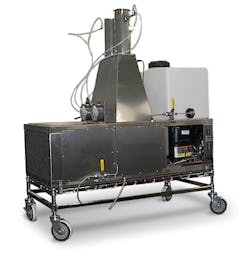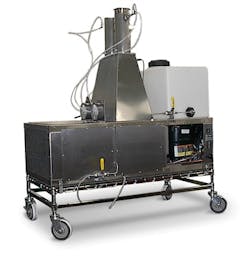Environmental control is the practice of managing the temperature, humidity, air circulation, ventilation and air pressure of a given space. Within certain types of pharmaceutical manufacturing processes, precise environmental control can help mitigate inefficiencies and potential problems.
Tablet coating is one such area. Inefficiencies during the coating process may result in contamination and tablet impurity in the form of tablet-to-tablet color variation, surface pitting from over-wetting, twinning due to spray drying, cracking or peeling. Some of these problems can be overcome by better control of the environment within the process. Over-wetting, for example, occurs when the coating hits the still-wet tablet surface and the surrounding air does not dry it quickly enough. Another example involves spray drying, which occurs when the coating hits the tablet surface after the moisture has been removed and may result in poor adherence of the coating.
Often, the coating process takes place in a fluid bed dryer. The tablet coating process begins when all the formulated tablets are placed into a hopper drum. As the drum rotates, baffles inside the drum stir the tablets. Warm air is drawn through perforations in the drum. The coating mixture forms a spray of fine droplets as it is pumped through the spray guns with compressed air. The distance from the spray guns to the tablet bed is adjusted to achieve even coverage across the entire batch. As the droplets hit the tablet surface, they spread into a film. The solvent is then removed rapidly by a blast of air, and the film sticks to the tablet. Each tablet undergoes multiple passes, building up the coating with each pass beneath the spray guns.
If tablet coating process has problems, the quality of the tablets may suffer. In such a case, it is conceivable that a regulatory agency could use safety or compliance grounds to mandate recall of a batch of tablets found to be coated inconsistently. Even if no agency intervenes, it stands to reason that consumers would be less likely to purchase medicine that does not look exactly the same within the same package. In either case, the result is lost time, lost productivity, lost product and, ultimately, lost profits for the manufacturer. Therefore, a consistent look and feel within a batch of tablets is critical.
Meeting the Challenge
To ensure consistency, many pharmaceutical manufacturers have scientists on staff who perform experiments to determine the coating procedure’s ideal temperature and dew point (the temperature at which water vapor condenses). Once those specific requirements are determined, machines are configured to maintain those requirements at all times.
Equipment that manages dew point control is essential to keeping these precise tablet-coating machines working at optimal performance. Dew point is an important measurement in the science of environmental control. When operating at temperatures below the dew point, environmental control units pull moisture out of the air stream. Humidifiers are then used, in a pulsing fashion, to control dew points to very precise levels.
Maintaining a consistent environment was the challenge facing one particular manufacturer of fluid bed machines. The manufacturer makes a portable research tool for a full range of fluid bed processes, including drying, granulating, coating and pelletizing, where optimal batch sizes range from 0.6 to 4 liter bowl capacities.
Air Innovations, a provider of specialty air conditioning, refrigeration and environmental control solutions in Syracuse, NY, was able to custom-design a unique solution giving the researchers the capability of a broad range of air flows, temperature settings and dew point settings to allow them to experiment with various environmental parameters.
The system, capable of delivering up to one ton of cooling and up to 2.5 kilowatts of heat at rates from 100 to 135 cubic feet per minute (cfm), also features a sophisticated proportional-integral-derivative controller that learns to constantly readjust process control outputs to minimize fluctuations. Solid-state relays are used to drive pulsed control devices (humidifiers and heaters) as they are faster and more reliable than mechanical relays, and provide more variable and exacting responses to heating or humidification demands.
The unit is made of stainless steel to facilitate cleaning and decontamination, and cleanroom-compatible insulations and sealants eliminate off-gassing concerns. Though it is ducted to the coating machine, it is portable so it can be moved to different areas of the facility if necessary. It includes ultrasonic deionized water humidification so that the steam generated is free of particles to prevent contamination of the process air.
A Successful Solution
The resulting solution was so successful that a competing manufacturer, whose fluid bed machines handles batches from 1 to 11 liters for spray granulation, drying, coating and rotor processes, contacted Air Innovations about implementing a similar solution for its process.
Tablet coating is only one potential application of environmental control in pharmaceutical manufacturing. Equipment can also be custom-designed for many other applications – blister packaging, for instance – and tailored to a particular manufacturer’s unique challenges and environmental limitations. Since every manufacturing process and plant has different intricacies and configurations, each solution may need to be different. However, by following the same general principles of process control, a tailored solution is possible for any pharmaceutical manufacturing process.
About the Author
Michael Wetzel, P.E., is president and CEO of Air Innovations, Inc., a leader in specialty air conditioning, refrigeration and environmental control solutions for end-users and original equipment manufacturers around the world. Headquartered in North Syracuse, N.Y., Air Innovations has capabilities ranging from concept development to prototyping, from sample runs to mass production. The company’s systems are custom designs that feature close-tolerance control of temperature (to plus or minus 0.01°C), humidity control (to plus or minus 0.5 percent stability), filtration and pressurization, and can be configured for a variety of spaces.
Wetzel joined Air Innovations as president and CEO in 1996, after he and his father Larry acquired controlling interest in Floratech Industries. Wetzel has grown Air Innovations from a company focused solely on floral coolers to one that addresses a wide variety of refrigeration, air conditioning and filtration needs. Prior to Air Innovations, Wetzel was based in France for four years and worked for a multinational company building cleanrooms in Europe and the Middle East. Previously, he worked as a project manager in the HVAC construction industry in the United States. He received a bachelor’s degree in mechanical engineering from Clarkson University and holds several U.S. patents. Wetzel is a licensed Professional Engineer.

